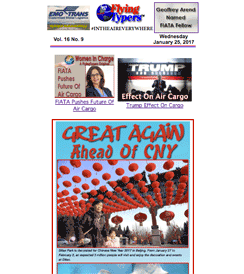

#INTHEAIREVERYWHERE
 |
 #INTHEAIREVERYWHERE |
| Vol. 16 No. 11 | Wednesday
February 1, 2017 |
| India Agents CASS Smackdown |
The
CASS (Cargo Accounts Settlement System) of
International Air Transport Association (IATA)
continues to be in the spotlight in India. IATA Competition Beef The controversy has taken many turns, with ACAAI (Air Cargo Agents Association of India), the apex body representing the air cargo industry in India, going to the Competition Commission of India (CCI) against IATA. Most recently, the Competition Appellate Tribunal (COMPAT) delivered an order asking for an investigation into the allegations that IATA was misusing its position and was active in anti-competitive practices in India. ACAAI Speaks
ACAAI sent out a release after the COMPAT
order and it mentions that the air cargo agents
association had filed “a complaint before
the CCI in December 2012 against the anti-competitive
activities and abuse of dominant position
by IATA and its Indian affiliate, IATA India.”
CCI, in its order dated June 4, 2015, ruled
that IATA had not contravened any of the provisions
of the Competition Act. ACAAI then went in
appeal to the COMPAT in August 2015 against
the order of CCI. Even More Agent Discord
“Further, instead of recognizing this,
CCI simply accepted the report of the DG verbatim,”
the release stated. COMPAT Finds Considerable Force
The two-member COMPAT Bench, according to
its order of November 15, 2016, “found
considerable force in ACCAI’s contention
that neither the Director General nor the
Competition Commission of India have applied
their mind on the aspect of abuse of dominant
position by IATA... COMPAT has set aside the
findings of CCI and has ordered a fresh investigation
by the Director General (DG) of CCI and has
directed the Authority to consider all contentions
raised by ACAAI, and to submit a fresh report
to CCI within a period of 60 days from the
date of receipt of the COMPAT order.” Prejudice Concern
Looking Ahead
Since then, the case has moved on with the
latest order from COMPAT about an investigation
to discover whether IATA was misusing its
position or was indulging in anti-competitive
practices in the country. Will the matter
be resolved once the investigation report
is submitted? Air cargo stakeholders are asking
that question. |
If
You Missed Any Of The Previous 3 Issues Of FlyingTypers Access complete issue by clicking on issue icon or Access specific articles by clicking on article title |
||
 Vol.
16 No. 8 Vol.
16 No. 8FIATA Pushes Future Of Air Cargo Chuckles for January 24, 2017 Rousing Finish Big Moves At AA Cargo |
 Vol.
16 No. 9 Vol.
16 No. 9Great Again Ahead of CNY Chuckles for January 25, 2017 Onwards Into 2017 So Smart It's Stupid Letters to the Editor for January 25, 2017 |
|
Publisher-Geoffrey
Arend • Managing Editor-Flossie Arend • Film Editor-Ralph Arend • Special Assignments-Sabiha Arend, Emily Arend • Advertising Sales-Judy Miller |
|